Analysis
Economic and Monetary Union
Pascale Joannin
-

Available versions :
EN

Pascale Joannin
The 9th European elections will take place from 23rd to 26th May in a highly tense context. China, Russia and also the USA are increasing their attacks against multilateralism; the populists are gaining ground everywhere in the European Union and the world - and finally, the UK, which opted for Brexit on 23rd June 2016, has constantly delayed the final date of its exit. The British will, in all likelihood, be obliged to take part in the election, if they have not left by 22nd May.
British Uncertainty
Everything had been organised for this European election to take place without the British, who had planned to leave the EU by 29th March last.
As a result, it was decided, given this departure, the first in the Union's history, to reduce the number of MEPs, totalling 751 at present, down to 705. This does not match however the loss of 73 British seats, because it was also decided (vote by European Parliament on 13th June 2018, European Council agreement 28th June 2018) to distribute a share of these seats to the benefit of 14 States: France[1] and Spain (+5), Italy and the Netherlands (+3), Ireland (+2), Austria, Croatia, Denmark, Estonia, Finland, Poland, Romania, Slovakia and Sweden (+1), i.e. 27 seats. This aimed to take on board their demographic development and to increase the respect of the "degressive proportionality" principle.
Because no majority was found by the British Parliament to ratify the withdrawal agreement negotiated with the EU on 25th November 2018, the British government asked and obtained of the European Council on 10th April, the postponement of the country's until 31st October 2019. Hence the British are due to take part in the election and there will be 751 MEPs distributed per Member State as in 2014.
Nearly 400 million citizens from 28 Member States of the EU are therefore being called to ballot from 23rd to 26th May next to renew their MEPs in Strasbourg. It is the only European institution to be elected by direct universal suffrage since 1979.
The Netherlands and the UK will vote on 23rd May, Ireland on 24th, Latvia, Slovakia and Malta on 25th May, the Czech Republic on 24th and 25th. The other 21 Member States will appoint their MEPs on 26th May.
MEPs will be elected for 5 years in this election (maybe less so for the UK). Germany will elect the most MEPs (96). The minimum number of MEPs will be 6 elected by Malta, Cyprus, Estonia and Luxembourg).
In more than half of the States (15 of the 28) there is an electoral threshold below which the lists do not win any seats (this varies from 2 to 5% according to the States). Similarly, it is obligatory to vote in 5 States.
Turnout
Since the first European elections by direct universal suffrage turnout has declined constantly. It decreased from 61.99% in 1979 (9 Member States) to 42.61% in 2014 (28 Member States). Whilst it is the only time when citizens can choose directly their representatives in the European Parliament, fewer and fewer of them turn out to vote. Paradoxically, as the European Parliament has gradually gained new powers, which now make it a true co-legislator, Europe's citizens are turning away from this institution. And yet they constantly state in the Eurobarometer surveys that they are "attached to Europe" (65%).
Some Member States (Belgium, Lithuania) chose to associate the European election with another election (regional, local, parliamentary or presidential), which generally helps reduce abstention.
In a bid to palliate this disaffection, information and communication work has been undertaken. In some Member States, many media decided to organise, more than they did in 2014 for example, TV debates between the main leading candidates, even the heads of the political Parties taking part in the election. The European institutions have also taken initiatives to encourage citizens to take part in the election. Hence, European Parliament has launched a non-partisan information campaign, independent of any trend or political party, 'this time I'm voting'. The European Commission has deployed the campaign "EU in My Region", with the aim of informing citizens about the projects financed by European funds near where they live.
It would be good if this time communication efforts achieved their goal. Because we cannot really say that the main novelty implemented in 2014, whereby the citizens voting in the European elections appointed the President of the Commission, were really satisfactory.
Appointment of the President of the European Commission
The future MEPs will take part in deciding on the next President of the European Commission as soon as they enter office. In July 2019 there will be a majority vote for or against the candidate put forward by the Member States. In 2014, the candidate of the party which won the greatest number of seats in the European Parliament, Jean-Claude Juncker (EPP, LU) was appointed. According to this system each European political party chose a 'lead' candidate to undertake the campaign. After the election the political party, which came out ahead saw see its Spitzenkandidat wage battle to win the MEPs' consent to lead the European executive. None of this is a given however, because it was the heads of State and government, during the European Council of 20th and 21st June who will put forward the candidate for the President of the Commission ... taking on board the results of the European elections.
The main European political parties have appointed their lead candidates (Spitzenkandidat) for the Presidency of the European Commission. MEP Manfred Weber (EPP, DE) was elected on 8th November 2018 during the European People's Party congress in Helsinki. The First Vice-President of the European Commission, Frans Timmermans was appointed during the congress of the European Socialist Party in Lisbon on 7th and 8th December. MEP, Jan Zahradil (ECR, CZ) was appointed by his party on 14th November. During a meeting in Brussels on 21st March, the Alliance for Liberals and Democrats for Europe (ALDE) appointed a team of seven candidates to lead their group (Team Europe), including European Commissioner Margrethe Vestager. MEPs Ska Keller (Greens/EFA, DE) and Bas Eickhout (Greens/EFA, NL) are the two candidates appointed by the European Green Party during the congress in Berlin on 23rd-25th November. The European Left elected Slovenian MP Violeta Tomič, and union activist Nico Cué.
A debate bringing together six candidates will take place in the hemicycle of the European Parliament in Brussels on 15th May. It will be organised by the European Broadcasting Union (EBU) and will be broadcast in Eurovision via the network of European broadcasters.
But will this be enough to raise awareness of the candidates beyond the borders of their countries of origin? The electorate votes in a national context - and nothing can be certain that they will be aware that by voting for a list, at the same time they know they are appointing their candidate as President of the Commission, notably if they do not know who the person is. The system is only really valid if there is a transnational list in which the lead candidate is elected in all States.
Hence, and according to the most recent forecasts, for the first time since 1979, as a whole, the two main Parties (EPP and PES) will no longer win the majority. They will be obliged to form a wider coalition with a third party. This might affect the appointment of the person called to preside over the European Commission. There is nothing to say, as in 2014, that the candidate of the party that comes out ahead will automatically be appointed. Negotiations might prove much more difficult than forecast to reach a new political balance.
Women's Partycipation
In response to the demand for the fair representation of the different political movements in a majority coalition (demographic balance between States of varying sizes, as well as a geographic balance), this time a new criterion will have to be satisfied: true balance between men and women.
Europe is the continent of women. In the EU we see the highest share of women MPs in the national parliaments (average of 30%), in the European Parliament (36.5%) and in the leading business organisations.
Of course, this is not yet completely equal, but European leaders would be well advised not to wait for the final negotiations to speak of the representation of women occupying the highest posts that are to be renewed, so as not to counter Europe's lead position in the world arena. This imperative for parity and for the feminisation of posts of responsibility is now inseparable from true representativeness, i.e. legitimacy.
The European Commission has never been presided over by a woman. Why should it not be the case this year? More seriously, the last two presidents had to remind the States which appointed many more men than women. Today there are 10 female Commissioners out of 28, Europe can do better. We might suggest that each government put forward to the president appointed by the Commission, two candidates for the position of Commissioner, a man and a woman.
The European Parliament has not had a female president in the last 20 years. It is possibly time to remedy this anomaly in the Assembly which comprises just as many women!
The Political Forces Standing
In the European Elections the voting method is the same for all States: proportional representation. But the rules are heterogeneous (minimum age of the voter, or the candidate, existence or not of constituencies, eligibility, distribution of seats, incompatibility regarding the accumulation of mandates etc ...).
Hence many parties (more than 230) are represented in the European parliament, notably in the States where there is no minimum threshold.
Most rally within political groups. In the outgoing 8th legislature 2014-2019, there were eight political groups in the European Parliament:
The group of the European People's Party (EPP),
The Progressive Alliance of Socialists and Democrats (S&D),
European Conservatives and Reformists (ECR),
The Alliance of Liberals and Democrats for Europe (ALDE),
The Confederal Group of the United Left/Nordic Green Left (GUE/NGL),
The Group of Greens/European Free Alliance (Greens/EFA),
The Group Europe of Freedom and Direct Democracy (EFDD),
The Group Europe of Nations and Freedom (ENF).
MEPs who do not join any of these political groups sit amongst the "non-attached".
The right struggling
Whilst in all likelihood the EPP (European People's Party) will remain the main group in the next Parliament, it will witness a slight decrease in its numbers (by about 40 seats), due to the poorer performance of the main delegations that notably form its ranks, in France and Spain (-7 each), Italy and Germany (-5 each). However, this decline should not be disproportionate to the defeat announced for the Socialist and Democrat group (S&D).
Disaster stricken left
All forecasts agree to say that there will be a sharp drop in the parties affiliated to the S&D group in the next legislature (-60 around). The largest decreases might be recorded in Germany (-11), France (-8) and in the other Member States. Although the postponement of Brexit is due to become a reality, the group might however be momentarily spared its losses with the upkeep of a delegation of the British Labour Party.
Breakthrough by the nationalist Parties
The poorer performance of the two main political groups might play in favour of less Europhile parties. Since some of these already scored well last time in 2014, like the National Rally in France, Law and Justice (PiS) in Poland and the 5 Stars Movement (M5S) in Italy, most of the ground won will be by the Italian Lega, which is due to take 21 seats.
The problem of these parties lies in their division into several groups (three at present): ECR, EFDD and the ENF, and nothing indicates that this will change in the short-term. The two Vice-Presidents of the Italian Council, whilst sitting in the same government, have indicated that they do not want to sit in the same group in the European Parliament. Although they all dislike Europe, they do not express it in the same way. They do not share the same approach to the migratory issue for example. Their divisions are also defined by their relations with Russia.
New Parties
Several parties (Vox in Spain, the Pirate Party in the Czech Republic etc ..) are due to make their entry into the European Parliament in 2019 without it being possible for the time being to place them in the existing groups. Hence the importance of the "others" category in the prefiguration of the future Parliament's composition.
This is the case with the République en marche (LREM), which is running neck and neck in the polls in France to win first place and is due to take around 21 seats in Strasbourg. Its representatives might form the strongest delegation in the ALDE group if they join it and take part in the new majority in the European Parliament. They might play the role of "kingmaker" to a certain degree.
The Polls
Just one month before the vote, the electoral campaign has now started. Everything is not yet stabilised, with many people indicating that they do not know who they will vote for if they go to vote, nor for which Parties they will vote. Moreover, turnout in the British election is still uncertain.
To find out about the lists standing, the parties' electoral programmes, voting rules, the reminder of the 2014 results in each State, the Robert Schuman Foundation has opened a dedicated site: https://elections-europeennes.robert-schuman.eu/en
European Election Results 22nd -25th May 2014
Turnout rate: 42.61%
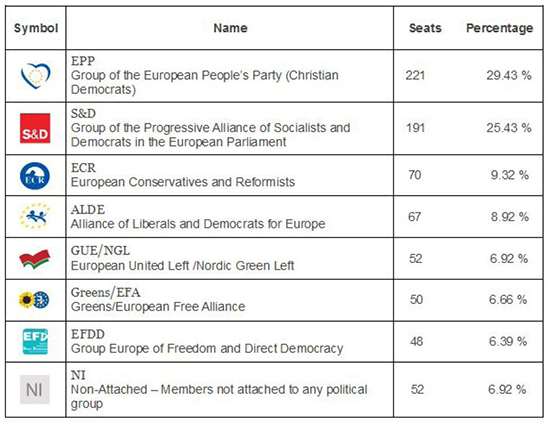
Distribution of Political Groups in the European Parliament (on 18th April 2019)
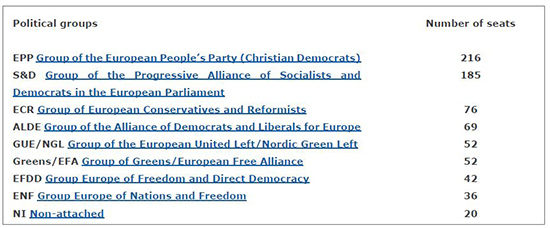
According to the Parliament's regulation, a political group must have at least 25 members from at least 7 Member States.
Source: https://election-results.eu/
Seat Forecast of the European Parliament elected in 2019[2]
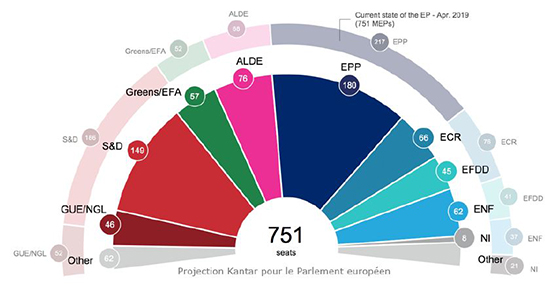
Source : European Parliament
The most recent polls in the 28 Member States - Forecasts in number of seats
Germany - 96 MEPs
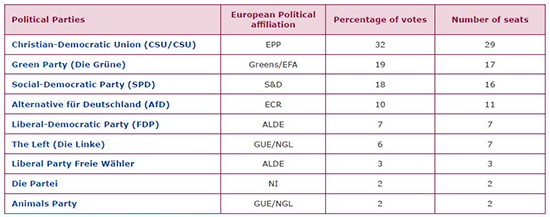
https://www.wahlrecht.de/umfragen/europawahl.htm
Austria - 18 MEPs

https://www.oe24.at/oesterreich/politik/Run-auf-EU-Wahl-OeVP-klar-vorn-SPOe-holt-auf-FPOe-Dritte/376697495
Belgium - 21 MEPs
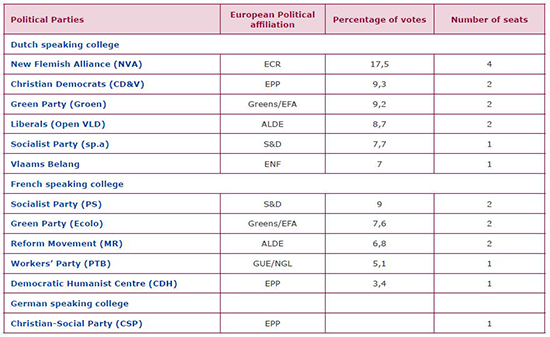
NB : the federal and regional elections will take place on the same day.
Bulgaria - 17 MEPs

Cyprus - 6 MEPs

https://www.ant1.com.cy/news/cyprus/article/335718/i-proti-megali-dimoskopisi-tou-ad1-gia-tis-euroekloges/?expandedarticle=true
Croatia - 11 MEPs

https://www.hrt.hr/506936/eu-izbori-2019/hrt-ekskluzivno-velika-borba-za-dvanaestog-zastupnika-u-europskom-parlamentu
Denmark - 13 MEPs
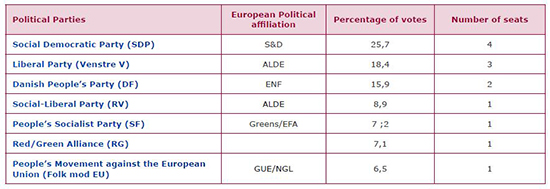
https://www.dr.dk/nyheder/politik/ep-valg/foerste-maaling-foer-europa-parlamentsvalg-dansk-folkeParty-staar-til-stor
Spain - 54 MEPs

Estonia - 6 MEPs

https://www.postimees.ee/6574620/kusitlus-europarlamendi-valimistel-jagavad-mandaadid-viis-erakonda?_ga=2.263665804.145229831.1556180153-1064980441.1554809614
Finland - 13 MEPs

France - 74 MEPs

http://www.lefigaro.fr/elections/europeennes/europeennes-24-d-intentions-de-vote-pour-lrem-toujours-talonne-par-le-rn-20190427
Greece - 21 MEPs

http://www.skai.gr/news/politics/article/402432/dimoskopisi-skai-diplo-provadisma-nd-epireazoun-skandalologia-parohes/
Hungary - 21 MEPs

https://index.hu/belfold/2019/04/17/partok_tamogatottsaga_partpreferencia_kozvelemeny-kutatas_fidesz_jobbik_mszp_zavecz_research/
Ireland - 11 MEPs

Italy - 73 MEPs

http://tg.la7.it/sondaggi/il-sondaggio-politico-di-marted%C3%AC-23-aprile-2019-23-04-2019-138144
Latvia - 8 MEPs
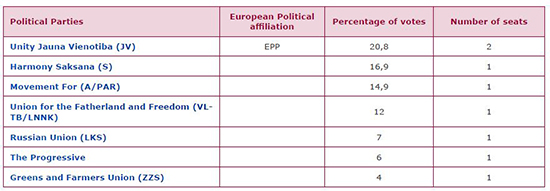
https://klubs.factum.lv/reitingi2019/
Lithuania - 11 MEPs

NB : the 2nd round of the presidential election will take place on the same day
Luxembourg - 6 MEPs

Malta - 6 MEPs

https://www.maltatoday.com.mt/europe2019/data
Netherlands - 26 MEPs
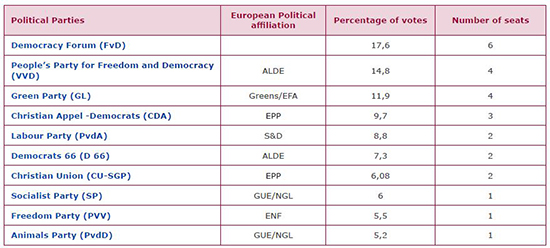
Poland - 51 MEPs

http://wiadomosci.gazeta.pl/wiadomosci/7,114884,24651157,sondaz-ibris-dla-radia-zet-koalicja-europejska-tuz-za-prawem.html#a=66&c=159&t=5&g=c&s=BoxNewsLink
Portugal - 21 MEPs

https://observador.pt/2019/04/18/europeias-sondagem-aponta-para-vitoria-do-ps-mas-com-os-mesmos-deputados-que-o-psd/
Czech Republic - 21 MEPs

https://cvvm.soc.cas.cz/media/com_form2content/documents/c2/a4911/f9/pv190425.pdf
Romania - 32 MEPs

NB : a referendum on justice issues will be held on the same day
https://www.aktual24.ro/sondaj-imas-crestere-semnificativa-a-pnl-se-consolideaza-pe-prima-pozitie-psd-prabusire-dramatica/
Slovenia - 8 MEPs

https://www.vecer.com/evropske-volitve-bitka-za-evroposlance-med-lms-sd-in-sds-sls-6692190
Slovakia - 13 MEPs

https://slovensko.hnonline.sk/1917637-prieskum-lsns-mieri-do-europskeho-parlamentu-kotlebovci-su-druhi-za-smerom
Sweden - 20 MEPs
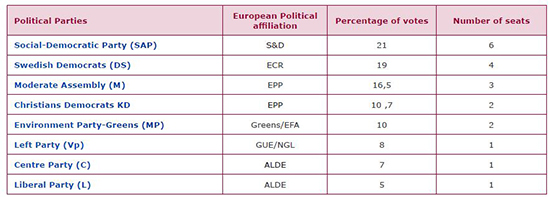
https://www.europaportalen.se/2019/04/s-tappar-infor-eu-valet-sd-kan-bli-storst
United-Kingdom - 73 MEPs
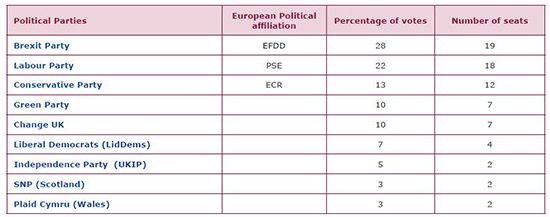
https://yougov.co.uk/topics/politics/articles-reports/2019/04/28/european-parliament-voting-intention-brex-28-lab-2?utm_source=twitter&utm_medium=website_article&utm_campaign=EU_VI_24_april_2019
On the same theme
To go further
Elections in Europe
Corinne Deloy
—
25 February 2025
Elections in Europe
Corinne Deloy
—
18 February 2025
Elections in Europe
Corinne Deloy
—
28 January 2025
Elections in Europe
Corinne Deloy
—
14 January 2025

The Letter
Schuman
European news of the week
Unique in its genre, with its 200,000 subscribers and its editions in 6 languages (French, English, German, Spanish, Polish and Ukrainian), it has brought to you, for 15 years, a summary of European news, more needed now than ever
Versions :



